Kaist
Korean

Dean’s Activities
Join KAIST, a Beacon of Hope Lightening Up the Future of Humanity
-
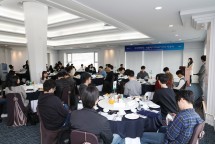
2018 Fall Dean’s List Awards C..
2018 Fall Dean’s List Awards Ceremony Held The awards ceremony for College of Engineering Dean’s List recipients of fall 2018 was held on April 4. More than 50 faculty, staff and students, including dean Choong-Sik Bae, vice-dean Sung-Yool Choi, and the manager of the Academic Affairs Team attended the ceremony at the KAIST Faculty Club (Young-Bin Gwan, 3F). The students named in the Dean’s List are those who have attained grades falling under the top 3% of their departments, or those who have demonstrated creativity in startup and idea competitions. The recipients were selected from among students enrolled in at least 9 credits of major courses out of at least 12 credits in the relevant semester. The event kicked off with a congratulatory address by Choong-Sik Bae, the dean of the College of Engineering. Dean Bae said, “Congratulations to all winners. I hope you will play key roles in enhancing the global standing of KAIST, and mature into outstanding leaders with good judgement.” The awards were presented individually, and the recipients had the opportunity to give an acceptance speech. In the session with alumni, the students interacted with Boah Kim, a former Dean’s List recipient (fall 2015) and Ph.D. student of the Department of Bio and Brain Engineering.
-
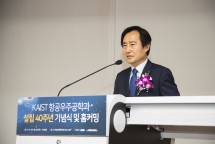
Department of Aerospace Engine..
The Department of Aerospace Engineering (Jae-Hung Han, head of department) celebrated its 40th anniversary in a two-day event beginning March 28 at the Academic Cultural Complex and Mechanical Engineering Building. Session 1 began with a congratulatory address by the dean of the College of Engineering (Prof. Choong-Sik Bae), followed by an introduction of the department and future directions. Session 2 was comprised of guest lectures.
-
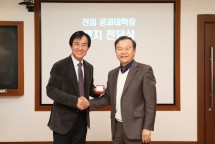
Appreciation Plaques Delivered..
The College of Engineering delivered appreciation plaques to its former dean and vice-dean on March 27. On this day, former dean Jong-Hwan Kim expressed how proud he has been of the department over the past two years, and encouraged the new dean and heads of departments to exert their best efforts for the College. <Photo 1. Dean Choong-Sik Bae and former dean Jong-Hwan Kim of the College of Engineering (delivery of appreciation plaques) > <Photo 2. Dean Choong-Sik Bae and former vice-dean Hyo-Choong Bang of the College of Engineering (delivery of appreciation plaques) > <Photo 3. Dean Choong-Sik Bae and former dean Jong-Hwan Kim of the College of Engineering (delivery of badges)> As proposed by former dean Jong-Hwan Kim, the KAIST Badge was delivered from the former dean to the new dean. The presentation of the KAIST Badge holds great significance as a culture unique to the College.
-

Fourth Industrial Revolution a..
On February 20, the Fourth Industrial Revolution and AI Korea Forum was held at the Gyeonggi Center for Creative Economy & Innovation. The forum focused on the landscape of AI in Korea, and featured a keynote speech by President Sung-Chul Shin and a lecture by Jong-Hwan Kim, the dean of the College of Engineering. The participants strengthened ties and shared the latest information through active discussions on related R&D and national policies for fostering new industries.
-
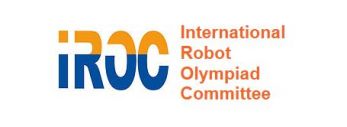
Daegu to Host 2020 Internation..
Daegu will be the host city for the 2020 International Robot Olympiad (IRO). At the 2018 General Assembly held in Manila, Philippines on December 15, the International Robot Olympiad Committee (led by President Jong-Hwan Kim, dean of the College of Engineering) announced that Daegu will be the host city for the 2020 IRO. Daegu sent a five-member delegation to Manila to present its bid, and received the majority of votes among various contenders, such as the United States, New Zealand, and Indonesia. IROC selected Daegu as the host city in consideration of the city’s robotics infrastructure, reputation as a leader in the robotics industry, and experience in organizing large-scale events, including the capacity to accommodate participants from around the world. ▲World Robot Olympiad held at EXCO, Daegu last August The international competition, comprised of more than ten categories such as Mission Challenge, Robot Gathering, Emergency Rescue, and Creativity, will be held at EXCO in mid-December 2020. More than 1,500 participants from 24 countries are expected to visit Daegu for the competition. Held for the first time in 1999, IRO is an annual international robot olympiad celebrating its 20th anniversary. It was founded by Jong-Han Kim, a KAIST professor, for the purposes of△enhancing scientific thinking among students, △ maximizing the potential of students with an interest in the robotics industry, and △ familiarizing students with the robotics industry and increasing demand for private robots. Korea hosted the 1st, 2nd, 5th, 6th, 7th, 11th, 14th, and 17th IRO, with the most recent held in Bucheon in 2015. With Daegu winning the bid, Korea will be hosting the IRO for the ninth time in 2020. In Korea, the preliminary rounds attract about 10,000 students each year. ▲ Opening performance at De La Salle Santiago Zobel School in Manila, Philippines on December 15 before an audience of 15 countries ▲ President Jong-Hwan Kim of the International Robot Olympiad Committee giving an opening address ▲ President Jong-Hwan Kim of the International Robot Olympiad Committee presenting a plaque of appreciation to Mayor Fresdeni of Muntinpula at the opening ceremony The 2018 IRO kicked off at Manila’s De La Salle Santiago Zobel School on December 15 with an opening ceremony, and will run through December 19. Participants from 15 countries, including Korean students who won the regional preliminary round last October, will be competing in the matches. ▲ Opening performance held on December 15 ▲ Opening performance held on December 15 ▲ Opening performance held on December 15 ▲ Distinguished guests gather for a group photo at the opening ceremony on December 15 ▲ Opening ceremony held at De La Salle Santiago Zobel School on December 15 ▲ Opening ceremony held at De La Salle Santiago Zobel School on December 15 ▲ Judges gather for a group photo at the opening ceremony on December 15 ▲ Opening ceremony held at De La Salle Santiago Zobel School on December 15 Gyu-nam Choi ceo@irobotnews.com <© iRobotNews. Unauthorized reproduction or distribution prohibited. >
-
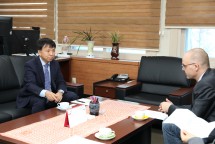
Deans’ Meeting With Department..
On November 26, a deans’ meeting was held between the College of Engineering (Vice-dean Hyochoong Bang) and the Department of Materials Science and Engineering of École Polytechnique Fédérale de Lausanne (EPFL).
-
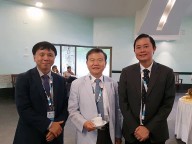
AOTULE 2018 Annual Conference
On November 21–23, the College of Engineering attended AOTULE 2018, and participated in the deans’ meeting and student conference. The annual conference was held from November 21 to 23 at the Indian Institute of Technology Madras (IITM). Formed in 2007 to enhance the quality of engineering education and promote international cooperation, Asia-Oceania Top University League on Engineering (AOTULE) consists of 13 engineering faculties from Asia and Oceania. It organizes an annual deans’ meeting, a student conference, and a summer student exchange program.
-
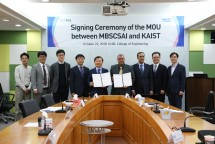
KAIST Signs MOU With Saudi Ara..
On November 22, the College of Engineering (Dean Jong-Hwan Kim) signed a non-binding memorandum of understanding with Saudi Arabia’s MBS College for Cyber Security, Artificial Intelligence, and Advanced Technologies (MBSCSAI) to strengthen cooperative efforts. Under the agreement, the two institutes will actively cooperate to create synergy in research, and work towards the launch of an undergraduate program in robotics. Located in Riyadh, MBSCSAI was established by Crown Prince Mohammad Bin Salman to support Saudi Arabia’s Vision 2030. The college aims to foster talent with practical skills that can be readily applied to industries upon graduation.
-
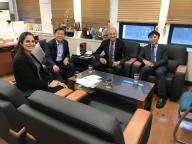
Talks With Presidential Delega..
On October 18, the College of Engineering held talks with the presidential delegation from the Okinawa Institute of Science and Technology (OIST). Representing KAIST were President Sung-Chul Shin, Dean Jong-Hwan Kim of the College of Engineering, Vice-dean Hyochoong Bang of the College of Engineering, and Dean Sang Kyu Kim of the College of Natural Sciences. The OIST delegation was composed of Dr. Peter Gruss, the president and CEO of OIST, and science assistant Dr. Sarah Wong. The representatives engaged in active discussions on the possibilities of cooperation between KAIST and OIST.
-
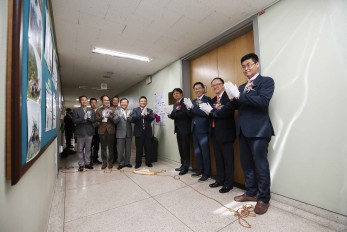
Opening Ceremony Held for AI Q..
On October 2, KAIST held the opening ceremony for the AI Quantum Computing Information Technology Research Center. The ceremony was attended by Heekyung Park, the vice president of research; Jong-Hwan Kim, the dean of the College of Engineering; and related personnel.
-
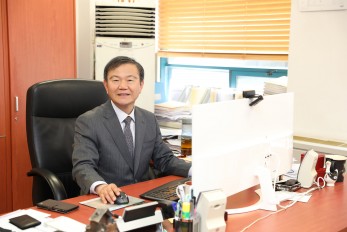
Dean’s Greetings for College o..
Dear alumni, students, and members of the College of Engineering at KAIST, Greetings. I am Jong-Hwan Kim and I am the dean of the College of Engineering. It is a great honor to be writing in the first issue of the College of Engineering newsletter. The College of Engineering newsletter contains the latest trends and research achievements of the 13 affiliated departments. I hope that this biannual newsletter will serve as a platform of exchange, playing a key role in keeping members informed on recent developments at the College. Since 2014, the College of Engineering has enhanced its global reputation through the English research webzine Breakthrough, which focuses on the excellence of research conducted by its members. Similarly, I expect this newsletter to contribute to the writing of a new chapter in history. The renewed website of the College of Engineering opened recently in October. Be sure to visit the website and share your experiences with others, and spread the word to anyone looking for information on the College of Engineering. The College of Engineering will continue to promote news-sharing and communication, so as to instill a sense of pride in alumni and all members. I would like to take this opportunity to extend my gratitude to Chair Jinah Park of the PR Committee, Vice-dean Hyochoong Bang, Professor Min H. Kim, and all faculty behind the publication of this newsletter and the website renewal. Your support and encouragement are highly appreciated. Thank you. Sincerely, Jong-Hwan Kim, Dean of College of Engineering
-
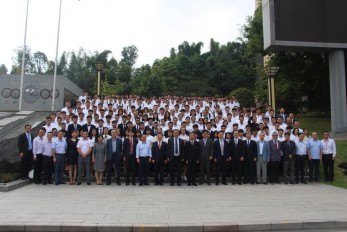
2018 Matriculation Ceremony at..
On September 7, the 2018 Matriculation Ceremony was held at the Liangjiang Campus of Chongqing University of Technology (CQUT). The event was attended by Xiaohui Shi, president of CQUT; vice presidents Xianjun Zeng and Bo Tian; Jong-Hwan Kim, dean of the KAIST College of Engineering; Professor Chang-Hee Lee, co-director of the Liangjiang Campus; Professor Myoung Ho Kim, head of the School of Computing; Professor Jaekyun Moon, head of the School of Electrical Engineering; eight other KAIST professors, and related personnel of CQUT Liangjiang Campus. The incoming class of 2018 included 189 undergraduate students, and 9 graduate students. The ceremony featured presentations by Yuanqiu Liu, graduate representative of the incoming class of 2018; Yaxin Wang, undergraduate representative of the incoming class of 2018; and Zhecheng Zhong, undergraduate representative of the incoming class of 2015. Yuanqin Liu and Yaxin Wang declared a vision to become experts in their field by utilizing the university’s high-quality resources and international platform. They hoped to study hard, to overcome adversity, and to bravely march into the future based on an international outlook. Zhecheng Zhong, one of the first KAIST students to pursue a double degree, shared his experience with the new students. He was determined to exert his best efforts, so as to reach greater heights while studying at the international campus. After the student presentations, Professor Chang-Hee Lee congratulated the new students again. He encouraged them to maximize their potential throughout the four-year course, and looked forward to seeing them become elites in computer science, electronics, and information technology. Dean Jong-Hwan Kim emphasized three points for the new students, namely, to set clear goals, to build strong interpersonal relations, and to embrace challenges. In the last presentation, CQUT President Xiaohui Shi sent a message of hope to the new students. His recommendation was for students to take a step-by-step approach over the next four years. He told them to develop an international outlook, to experience the joys of deep thinking and patience, and to freely express themselves. After the ceremony, the presidents, faculty, staff, and students gathered at Shiji Square for a group photo.

